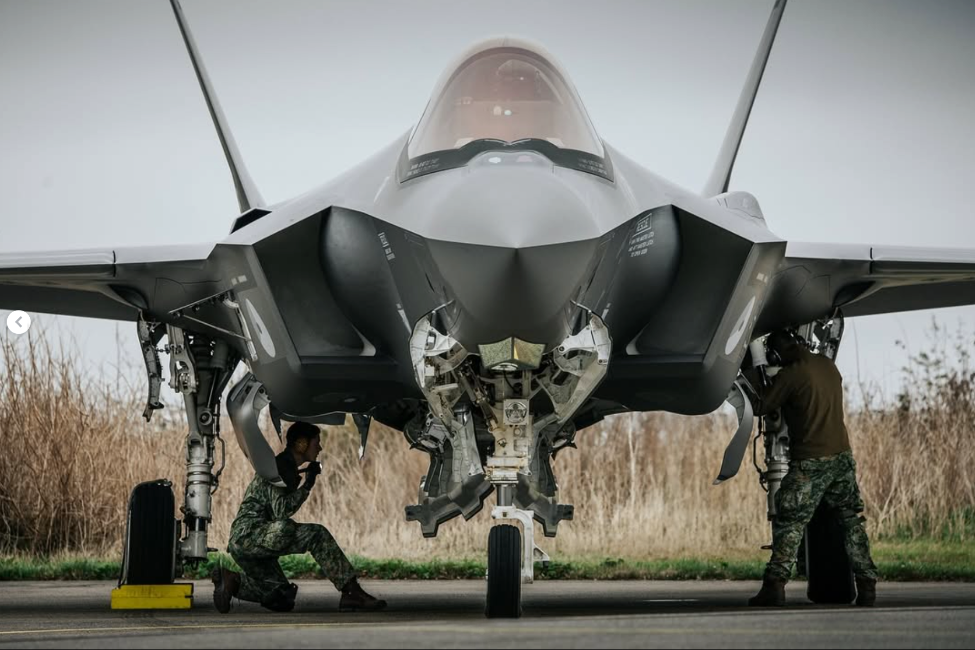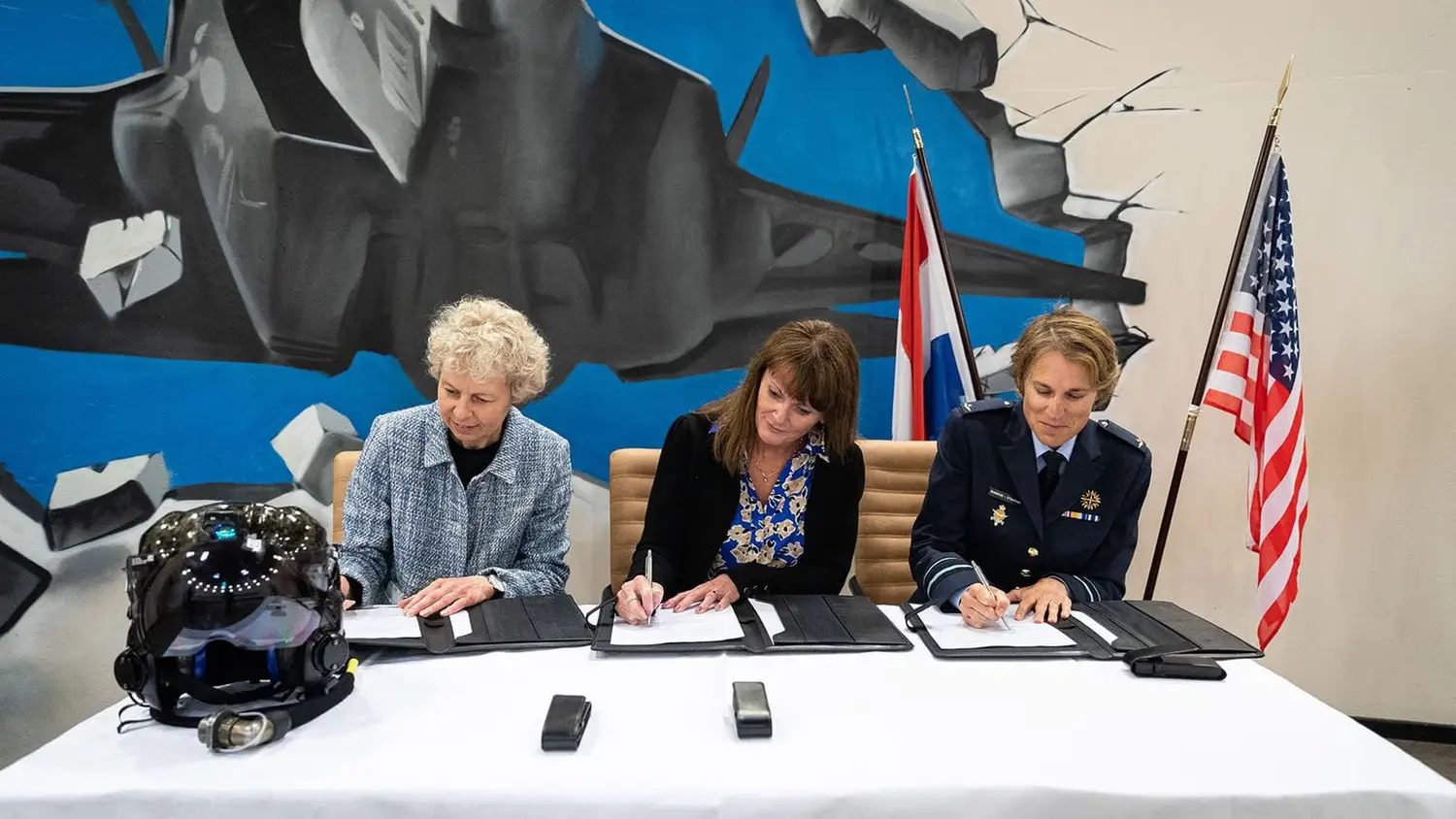READINESS REIMAGINED > SUSTAINMENT AND SUPPORT IN AN UNPREDICTABLE WORLD
studio | READINESS REIMAGINED | CHAPTER 6
As militaries modernise and mission demands grow, embedded engineering support is essential to sustainment operations. By placing expert personnel close to the point of need, this approach reduces downtime, improves availability and builds stronger, more responsive partnerships with end users.
An F-35 fighter jet prepares for flight operations. On-site engineering support is increasingly vital to maintaining aircraft readiness and sustaining high operational tempo. (Photo: RNLAF)
Armed forces worldwide are under growing pressure to maintain high readiness levels across a range of complex and evolving mission sets. Embedded, in-country support is crucial in meeting this challenge, as demonstrated by the partnership between the Royal Netherlands Air Force and Collins Aerospace.
From routine component servicing to performance-based logistics (PBL) contracts that guarantee fleet availability, in-country support allows customers to keep equipment operational without the delays and dependencies of cross-border repair cycles.
Collins Aerospace, an RTX company, provides such support to the US and its allies, with a wide range of support and maintenance work covering such platforms as the F-15, F/A-18 and F-22 to the Eurofighter Typhoon and CH-53 helicopters.
In the Netherlands, the company partners with the RNLAF to operate an F-35 Pilot Readiness Centre (PRC) from the RNLAF’s Soesterberg site, with the work conducted through a government-owned, contractor-operated (GOCO) approach.
Soesterberg is the first such PRC outside the US. This means that pilots can be trained locally on the use of the F-35 helmet while maintenance and support work can be conducted in the region.
Pioneering partnership: Collins Aerospace in the Netherlands
The partnership sees Collins Aerospace work directly on-site at Soesterberg; company experts are also embedded in RNLAF Air Bases, including Leeuwarden and Volkel. They work directly with pilots and other RNLAF personnel to address their problems immediately, explained Colonel Ted Meeuwsen, commander of the Centre for Man in Aviation in the Royal Netherlands Air Force (RNLAF).
‘It is fantastic because you’ve got a Collins Aerospace representative on-site listening to the problems that the pilot needs to address – it means we can solve problems immediately at the specific Air Base or in Soesterberg,’ Col Meeuwsen said.
Col Meeuwsen said this brings crucial operational benefits, pointing to significant time savings for the RNLAF and other customers throughout Europe. Some problems that would have taken 5-10 weeks to resolve ‘can now be solved within an hour’.
Embedding engineers on-site means they can be flexible, providing oversight of a repair process as it happens in real-time, said Chris Norris, associate director for military avionics after-market business development at Collins Aerospace.
‘We can offer our customers whatever they need to make their mission successful, from a simple telephone call to physically deploying engineers with units,’ he said. ‘Our on-site engineers ensure that not only are the aircraft ready when they need to go, but that the aircraft remain operational during the mission.’
Cross-border advantages
Importantly, the PRC is available for F-35 customers throughout Europe, not just the Netherlands. Col Meeuwsen explains that the partnership has now formed ‘a kind of web’, including other allies.
This places the Netherlands at the heart of a dynamic, cross-border partnership: a “hub and spoke” arrangement incorporating the major Collins Aerospace regional centre in Heidelberg, Germany.
Collins Aerospace and the Royal Netherlands Air Force (RNLAF) established the Pilot Readiness Center at the RNLAF’s Center for Man in Aviation based at Soesterberg, The Netherlands. (Photo: Collins Aerospace)
Partners such as Denmark and Norway can benefit from reduced sustainment cycles, with all that means for force readiness and cost control in an increasingly volatile European security landscape. ‘For them, it was an eye opener – a game-changing approach,’ said Col Meeuwsen.
Norris noted that on-site capability provides immediate reach-back for customers into the Collins Aerospace knowledge base and intellectual property, reducing downtime and increasing the availability of their assets.
‘When we have somebody on site, we’ve already got all of that intellectual property pre-placed,’ Norris said. ‘We have all of the right approvals for them to immediately access that information, resolve the issue and get that aircraft flying again.’
Embracing technological advances
Such partnership models must embrace new technologies in training and beyond to ensure they remain fit for purpose into the future. There is a particular need to tap the expertise of small and medium-sized enterprises (SMEs), said the colonel.
‘Giant leaps are being made right now in such areas as AI, virtual reality, augmented reality, eye tracking, sensor technology and more,” he said.
It will be vital for Collins Aerospace and the RNLAF to develop a footprint capable of incorporating such advances, he said, pointing to the rapid evolution of the drone sector. ‘We have to speed up the innovation cycle,’ he added.
The service sector is diverse and challenging, ranging from 40-year-old equipment to advanced, modern, digital-first systems, agreed Michael Nelson, Collins Aerospace’s director of service operations for military avionics. Customers’ demands constantly grow and evolve, fuelling the need to embrace new technologies.
Nelson said it is vital to embrace technological innovation in areas such as AI and data analysis to keep pace with the rapid rate of change while continuously leveraging core methodology to reduce the timescales for customers.
For Collins Aerospace, an experienced team of service engineers provides the foundation for this adaptability, Nelson concluded.
‘You’ve got people from various backgrounds and different years of experience, meaning they can provide insights that help us look at things differently and find a new process or technique to do the job more quickly – and more effectively.’
In 2022, Collins Aerospace signed two new Letters of Intent (LOI) with the Royal Netherlands Air Force (RNLAF) to expand support of their F-35 and CH-47F programmes. (Photo: Collins Aerospace)
Building a true partnership
Such partnerships – and the need to reduce sustainment cycles – will only grow in importance given the growing security challenges in Europe, noted Col Meeuwsen.
‘We can’t afford to send stuff to any other country and say “ok, let’s wait 10 weeks to solve issues”,’ he stressed.
Above all, partnerships like the RNLAF and Collins Aerospace succeed because they transform the nature of in-country support.
Col Meeuwsen noted that they are about far more than cost reductions, arguing that a successful partnership goes beyond a simple financial dynamic.
‘You’re almost family,’ he said. ‘In our case, partnership is about having confidence in each other and making the world a little bit better. That’s the difference compared to a typical customer/manufacturer relationship.’


